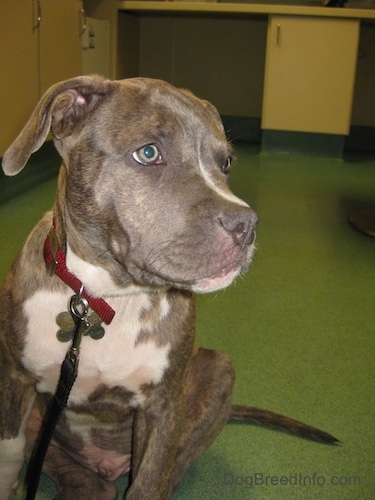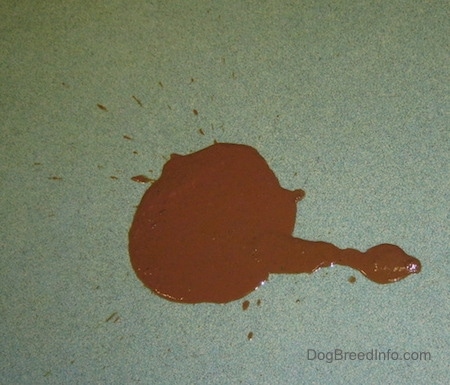
All dogs, at one point or another, can have a bout of diarrhea. Most diarrhea lasts a couple days, however when loose bowels continue over a long period of time it is a cause for concern; especially if the diarrhea gets severe, and is uncontrolled liquid squirts. Think of the dog as your baby (human). If your baby has a soft stool in his/her diaper, it may not be a cause for you to seek your doctor’s advice, for instance, if you have tried a new food which upset the baby's belly. If this is the case for your puppy, it may be fine for you to treat it at home. However, if your baby had uncontrolled diarrhea, you would seek a medical doctor's advice, as there could be an underlying cause. Like a baby, a puppy can dehydrate FAST from severe diarrhea. REMEMBER, diarrhea can be mild or severe and the treatments differ.
In a young puppy, diarrhea can be caused by viruses and parasites. A stool sample to the vet is a good idea to check for Coccidia (Coccidiosis), Giardia, Trichomonas or other infections. If your litter of two-week-old puppies gets diarrhea, it could be worms. Normally we do not worm pups till three weeks, but some do it at two weeks. When worms become active, it can cause diarrhea. If the diarrhea worsens, even after using a worming medicine, you may need to check for coccidia. The incubation period is 13 days, and the dams often carry it. They would come in contact from the dam at birth, or shortly after; they are not born with it. If a 13-day-old puppy has diarrhea, it often means coccidia. This requires vet medicine to treat. It can be found in a stool sample.
Some dogs/puppies can get diarrhea from the excitement/stress of being away and then coming home.
Some dogs get doggy flu bugs, others may eat a strange food and cause stomach upset.
Diarrhea from change is common. You need to deal with it and not ignore it.
Ignoring diarrhea in a puppy lowers the immune system, and can dehydrate even an adult dog.
Puppies can get a bug much easier if they are down and weak, so diarrhea is not something to ignore.
Ask your vet for a sheet on what to do for diarrhea. Each vet has slightly different versions but they all have a sheet, as it is common.
The following home remedy is for early onset diarrhea. A dog with severe diarrhea needs vet attention, as he needs fluids.
The greatest worry with ongoing diarrhea is dehydration.
If you are treating the early onset of diarrhea, and the dog is not showing ANY signs of dehydration, you need to fast the dog for a day—no water, no food. (I find that a full 24 hours is too long for a puppy under eight months; you may want to give her some bland food throughout the day (rice and chicken), and a bit of water and then NOTHING until the next morning), small pups try 12 hours. This rests the tummy. For a dog or pup with secondary severe diarrhea (uncontrolled liquid squirts), omitting the water is NOT an option, they MUST have fluids if dehydration is happening. But if dehydration is not a problem, and diarrhea is early onset and controlled, omitting water for a bit helps (12 hours is usually OK for a puppy). It is just to give the tummy a rest. This is easier done at night.
BUT...if the puppy has severe diarrhea (progressed into more serious diarrhea) and dehydration could be a secondary problem, YOU MUST give the puppy water—or better yet, Pedialac—or intravenous fluids (Lactate Ringer's). Talk to your vet before using IV fluids. Mild diarrhea is soft stools, or pudding texture; serious diarrhea is projectile, uncontrolled watery texture—LIQUID SQUIRTS.

Do NOT fast any puppy under seven weeks. A young puppy with diarrhea usually needs medical attention immediately. Pups under four weeks can die quite quickly with diarrhea.
It can sometimes be hard to determine the cause of diarrhea unless further testing is done. It is a good idea to take a stool sample to your vet if diarrhea cannot be stopped in a couple days, OR if it has blood in it, or if it is watery squirts.
It is important to consume the same amount of fluids as the volume that has been lost in order to prevent dehydration.
So, if your dog has a couple runny poops, omitting water for a bit is OK (for EARLY onset diarrhea) to stop diarrhea before it progresses to secondary severe diarrhea.
BUT...if the diarrhea has turned secondary, and is coming out as fast as you put fluids in, intravenous may be needed. DO NOT OMIT water for a dog with uncontrolled severe diarrhea.
Diarrhea can be treated at home in the early stages, and if caught early, turned around. The key with diarrhea is to stop it fast, BEFORE it turns into secondary diarrhea with dehydration. Once the immune system is down, it is an invitation for other problems.
If the dog is vomiting and/or has diarrhea, and is dehydrated then you must seek vet attention to administer fluids intravenously. A good test method for dehydration is, if the skin on the dog's neck stays up when lifted and doesn't drop down instantly in place when released.
Recipe for early onset diarrhea:
Pepto Bismol every 3 - 4 hours (You will need a syringe... good luck!)
liquid pink Pepto 1/2 to one teaspoon each time, for every 10lbs of dog.
Pepto is highly recommended by vets for puppies over six weeks old. (for younger pups, call your vet).
Second day: (or first day with puppies).
Boil rice—1 cup rice, 2 cups water, 1 chicken breast. The chicken flavor permeates the rice when you cook it together making dogs LIKE to eat it. (You can use rice Pablum). Feed ONLY the rice mixture for the first day after fasting. REMEMBER, if your dog has secondary diarrhea (uncontrolled watery squirts), YOU MUST get fluids into him/her. This can be done by syringe, or intravenously.
Another vet recommends adding a little bit of low-fat plain yogurt and a little bit of low-fat cottage cheese. Canned pumpkin is also known to help treat diarrhea...I give it to my lactating dams.
I feed mine this rice mixture three or more times during the day with small amounts of water.
You can also buy a tube of Nutri-Cal from the vet. It is a toothpaste-type tube of nutrition and calories and will give a weak puppy the sugars, nutrition and calories he needs. It is a very good miracle pick-me-up paste.
Third day: You can start mixing in the chopped up boiled chicken with the rice. (You can also purchase a Gastro food from the vet, which is an easily digested food for this purpose, and start mixing that in too.) The vet may recommend that you keep the dog on Gastro for quite a few days and then start mixing in his normal food over a period of a few days.
Sweet potatoes are also a natural stool hardener.
If your puppy or dog has diarrhea that is getting WORSE, not better, call your vet ASAP and follow their advice.
Courtesy of MistyTrails Havanese